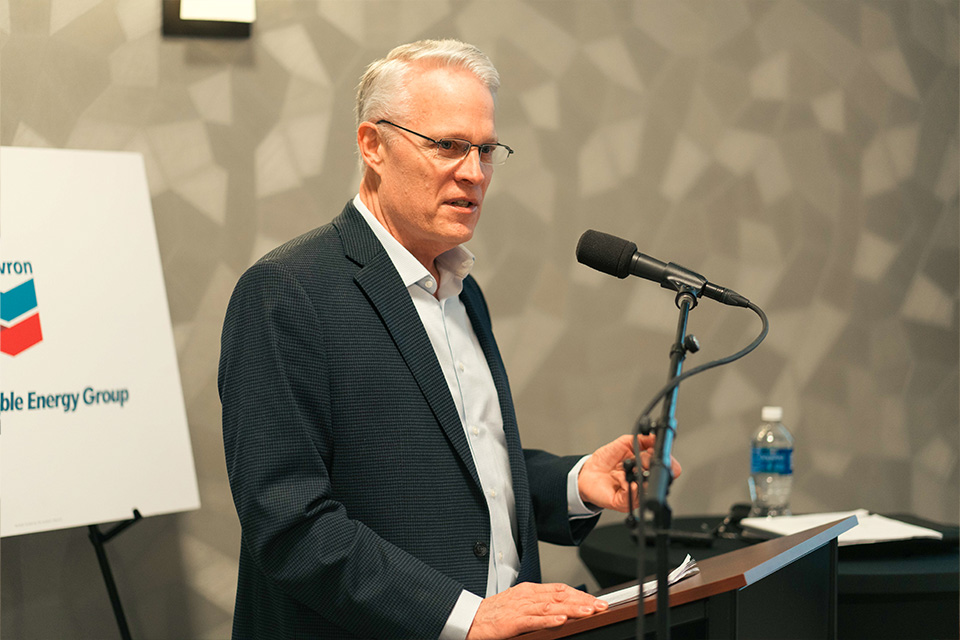
(Photo: Iowa Soybean Association / Joseph Hopper)
Former trade ambassador: 'Our trade is important and worth fighting for'
December 21, 2023
Achieving real trade opportunities for U.S. soybean farmers means being direct and open with potential buyers and not letting partisan politics get in the way.
That was at the heart of Ambassador Allen Johnson’s presentation during this week’s Iowa Soybean Association (ISA) meeting and winter soy summit.
Johnson, the former chief agricultural negotiator in the Office of the U.S. Trade Representative (USTR) for the George W. Bush administration, says free trade has been lacking or too contentious thanks to partisan bickering, tariffs and other hurdles over the last several years.
“We used to believe that ‘if you build it, they will come,’” Johnson says. “Open up trade, jobs will come, investments will come, quality of life would improve; there would be economic development opportunities.”
Johnson, a former CEO for the ISA, says Democrats and Republicans have become mired down in political posturing since the Clinton administration.
“In the 1990s and early 2000s, the dynamics changed,” he says.
President Bush, Johnson says, was a true believer in free trade agreements (FTA) and campaigned on the issue, even arguing that Bush was more in tune with agriculture compared to other recent administrations.
For trade opportunities to get back on track, Johnson says trade negotiators for the USTR, agriculture community, commodity groups and others must be on the same page, followed by sincere discussion between members of Congress and whichever administration is occupying the White House.
It’s also the responsibility of the USTR to interact within every cabinet position within the administration because ag interests impact all areas of the government, whether it’s Commerce, Energy or even the State Departments.
“Every negotiation for an FTA is sometimes the most difficult and politically sensitive issue to cover,” Johnson says.
To do the job, negotiations with all players, especially with those countries Americans are hoping to strike a deal, requires optimism, a thick skin, problem solving and not being risk adverse, he says.
The ambassador adds that recognizing the dynamics of the situation – culturally and politically – as well as acknowledging the U.S. must be tough and clear in its proposals is not unreasonable.
“We have to stand united,” Johnson says. “It’s a single undertaking – nothing is agreed to unless everything is agreed to.”
Recent trade opportunities however, he says, have been upended by too many players not getting what they want, issues with the World Trade Organization (WTO) and disagreements over Permanent Normal Trade Relations (PNTR) designations for free trade with foreign countries.
“Under (former President Donald) Trump, everything turned upside down,” Johnson says, pointing to Trump’s lack of trust with the WTO and a tariff war that impacted trade negotiations.
‘You have to be workable’
Johnson says bilateral and regional trade agreements for agricultural interests are top of mind these days. He says it’s important that everyone has a sense of ownership in negotiations so that wading through the noise on Capitol Hill doesn’t impede real agreements that will benefit soybean farmers.
“We have to find consensus on the Hill,” Johnson says. “If you want the administration to work with you, you have to be workable.”
Johnsons says it’s critical U.S. trade operates more efficiently because our Chinese and European competitors are “everywhere” around the globe.
He says bilateral deals, as difficult as they can be, are much easier to get through Congress, especially if there are provisions that allow for expansion to other countries.
Johnson also adds that negotiators from other countries must also be told upfront that if they’re “not part of the solution, they’re part of the problem.”
What does the future hold?
As part of the ISA’s annual meeting, board members and delegates continued their call for trading opportunities.
“We support bilateral and regional Free Trade Agreement (FTA) negotiations that are focused on countries that represent commercial markets for U.S. soybeans and products, livestock products and agricultural exports in general,” notes one of the approved policy resolutions.
Johnson says regardless of who’s elected to the White House in 2024, the next several years could be a window of opportunity for trade.
Johnson says President Biden will want to add to his legacy and that usually means foreign policy – ag trade could be a part of that.
Former President Trump or another Republican like Ron DeSantis or Nikki Haley, Johnson adds, will want to be impressed upon the importance of trade, especially given the concerns with China and Russia.
“Our trade agenda is important and worth fighting for,” he says. “We need to be proactive, not reactive. Nothing should be off the table.”
Back